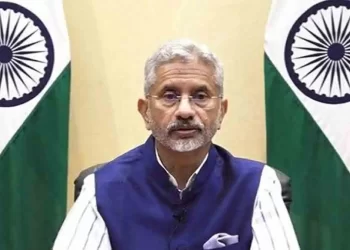The Prime Minister, Shri Narendra Modi addressed the ‘Jal-Jan Abhiyan’ of Brahma Kumaris via video message today.
Addressing the gathering, the Prime Minister expressed delight at getting the opportunity to become part of the launch of the Jal Jan Abhiyan by Brahma Kumaris and said that it is always a special experience to learn from them. “The blessings I received from the late Rajyogini Dadi Janki ji are my biggest asset”, the Prime Minister said. He recalled the opportunity to come to Abu Road to pay homage after the demise of Dadi Prakash Mani ji in 2007. The Prime Minister noted the warm invitations that he received from the Brahma Kumari sisters in the past years and said that he always tries to be present among them as a member of the spiritual family. He recalled the programs of ‘Future of Power’ in Ahmedabad in 2011, 75 years of the establishment of the institution, Sangam Teerthdham in 2013, the 80th foundation day of Brahma Kumaris Sansthan in 2017 and the program during the Amrit Mahotsav, and thanked them for their love and affinity. He emphasised his special relationship with Brahma Kumaris and said that rising above self and dedicating everything to society has been a form of spiritual practice for all of them.
The Prime Minister stressed that the Jal-Jan Abhiyan is being launched at a time when water scarcity is being seen as a future crisis all over the world. He noted that the 21st-century world is realizing the seriousness of limited water resources on earth and pointed out that water security is a huge question for India due to its large population. “In the Amrit Kaal, India is looking towards water as the future. There will be a tomorrow if there is water”, the Prime Minister remarked and underlined that joint efforts have to be made starting today. The Prime Minister expressed satisfaction that the country has turned water conservation into a mass movement and said that the Jal-Jan Abhiyan of Brahma Kumaris will give new strength to this effort of public participation. He noted that the reach of water conservation campaigns will also get a boost thereby boosting its effect.
The Prime Minister highlighted the sages of India who had created a restrained, balanced and sensitive system regarding nature, the environment and water thousands of years ago. He recalled the age-old saying of not destroying water but conserving it and underlined that this feeling has been a part of India’s spirituality and our religion for thousands of years. “Water conservation is the culture of our society and the centre of our social thinking”, the Prime Minister continued, “That’s why we consider water to be God and our rivers as mothers.” He emphasised that when society makes such an emotional connection with nature, then sustainable development becomes its natural way of life. He reiterated the need to seek solutions to the challenges of the future while rekindling the consciousness of the past. The Prime Minister stressed the need to instill faith in the countrymen towards the values of water conservation and remove every obstacle that causes water pollution. He underlined the role of India’s spiritual institutions like the Brahma Kumaris towards water conservation.
The Prime Minister lamented the past decades where a negative thought process had developed and topics like water conservation and environment were deemed difficult. Highlighting the changes in the last 8-9 years, the Prime Minister said that both this mindset and the situation have transformed. Giving the example of the Namami Gange campaign, the Prime Minister highlighted that not only the Ganges but all its tributaries are also getting cleaned while campaigns like natural farming have also begun on the banks of the Ganges. “The Namami Gange campaign has emerged as a model for various states of the country”, the Prime Minister remarked.
Throwing light on the ‘Catch the Rain campaign’, the Prime Minister noted that the depleting groundwater table is also a major challenge for the country. He informed that water conservation is also being promoted in thousands of gram panchayats of the country through the Atal Bhujal Yojana. The Prime Minister also touched upon the campaign to construct 75 Amrit Sarovar in every district of the country and said that it is a huge step towards water conservation.
Underlining the contributions of women in water conservation, the Prime Minister said that women from the villages are leading important schemes like the Jal Jeevan Mission through water committees. He emphasised that Brahma Kumari sisters can play a similar role in the country as well as at the global level. He also touched upon the need to raise issues related to the environment along with water conservation. The Prime Minister informed that the country is promoting techniques like drip irrigation for balanced use of water in agriculture and urged the Brahma Kumaris to motivate the farmers on increasing its usage.
The Prime Minister also highlighted that the whole world is also celebrating International Millet Year. Millets and urged everyone to include coarse grains in their diet. He underlined that Shree Anna Bajra and Shree Anna Jowar have been a part of India’s agriculture and food habits for centuries. He informed that millets are rich in nutrition and consume less water during cultivation.
Concluding the address, the Prime Minister expressed confidence that the Jal-Jan Abhiyan will become successful with a joint effort and help in building a better India with a better future.
Source:PIB







 Finance
Finance







